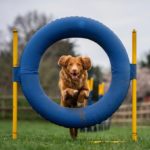It’s not always sunshine and rainbows with some dogs. Some may have been abandoned, not trained properly or even abused, which can result in some aggressive and defensive behaviors.
Whilst this can be difficult to deal with, it is not the end of the world, as dogs can be trained no matter what age they are, or what they’ve been through in the past.
Some dogs are simply just aggressive towards others, it may not be a failure on your part, as it could just be the breed, or your dog has more aggressive and defensive instincts than usual.
The good news is that aggression, whether it is towards other dogs, animals or people is a behavior that can be adjusted.

So, how do you tell if you have an aggressive dog, or whether your dog’s behavior needs to be corrected, or trained out of them. Let’s take a look at some of the common signs of aggression in dogs.
Signs Of Aggression In A Dog
For the most part, dogs will display aggressive behavior by:
- Growling
- Barking
- Snarling
- Snapping
- Biting
- Standing Tall
- Raised Hackles
- Ears Pinned Back
- Nipping
Dogs may also show signs of aggression around other dogs as they will try to dominate them and become the alpha.
They may also display aggressive behaviors such as nipping or mouthing on the ears of another dog in order to make them submit to them. Alternatively, an aggressive dog may try to leap on top of another to dominate them.
It’s important to know the early signs of aggression, so that you are able to intervene with training before your dog starts to bite or attack other dogs unprovoked.
Why Is My Dog Aggressive?
Your dog may show signs of aggression for a multitude of reasons, and it really does depend on the dog itself. That being said, the most common reason why a dog will become aggressive is because they are fearful or anxious of something.
Dogs may behave in an aggressive manner around other dogs or strangers simply because they are nervous and fearful, and the aggression is a means of defending themselves.
This can be easily avoided with proper socialization with dogs, people and other animals early on in their lives. However, if your dog has been exposed to negative experiences with other dogs in the past, then they may show aggression due to that.
Another possible reason for aggression is that your dog is trying to be protective of you, or their toys or food. They may act out aggressively to get you or someone else to back off and get away from them whilst they eat or play with their favorite toy.
Others become aggressive when they are frustrated.
For instance, if you have a dog that does not really enjoy playing with other dogs, and they are in a park where an unleashed dog is jumping on them, trying to play with them and bothering them, then they may snap because they don’t like it.
In addition, most dogs become aggressive when they are around other dogs or people that they feel threatened by.
Dogs often want to establish a social hierarchy, and will want to become the alpha or leader.
To establish this hierarchy, they will attempt to correct other dog’s behavior by dominating them through signs of aggression to put them in line.
Whatever the reason for your dog’s aggression, this is a behavior that needs to be corrected for your sake, your dog’s sake and everyone around you.
Can Aggression Be Trained Out Of A Dog?
Even if your dog is very aggressive, they are not a lost cause. Aggression can be trained out of a dog. Forget all of the times that you have heard that you cannot teach an old dog new tricks, it’s simply untrue.
Dogs can be trained at any age, and you can also correct old or negative behaviors at any age with the right training, encouragement and patience.
If you’re not sure how or if you are not confident enough to train aggression out of your dog, then it could be worth hiring a professional dog trainer who will know exactly how to handle the situation, and can help you understand and work with your dog.
Is It Ever Too Late To Train An Aggressive Dog?
No, it is never too late to train an aggressive dog.
We do always recommend that you start training as soon as you have a dog, or when it is a young puppy, as it will be easier to prevent undesirable actions and behaviors in the future, but you can train a dog into its adolescence and adulthood.
It’s never too late to train a dog, and it can still be done as long as you are dedicated, the sessions are frequent and consistent, and you use a lot of positive reinforcement.
How To Train An Aggressive Dog
The first step is to contact your veterinarian. Some dogs can start to show signs of aggression due to an underlying medical condition, so it is worth ruling this out first.
In addition to this, a veterinarian can also recommend experienced dog handlers to help you train your aggressive dog.
To start training an aggressive dog, you need to work out their triggers. Who is the dog aggressive towards? Strangers? Other dogs? Find out.
Then, you can work with a professional dog trainer to help you safely and effectively correct your dog’s behavior. The most common way to train an aggressive dog to behave is to condition it to not be fearful, defensive or aggressive.
This is often done by exposing them to a controlled environment where they may normally be aggressive, and guiding them and training them to behave in a certain manner with positivity, patience, and positive reinforcement with lots of encouragement, affection and treats.
You should never chastise your dog for bad behavior such as hitting them or yelling at them as this will only increase their fear and anxiety, which could result in more aggression.
Instead, ignore the bad behavior, and encourage the good behavior with treats and rewards.
This will slowly condition your dog to behave in a positive and good manner rather than bad because they will learn that they cannot get what they want, or receive affection from you unless they behave in an appropriate and controlled manner.
Then, you can work on certain behaviors and situations on your training journey.
For instance, if your dog learns that good behavior is rewarded with treats, they will begin to focus on you in most situations, and will zone out other dogs or distractions in the hope for rewards.
This can help them get over their aggression, and prevent them from behaving in this way in public. As your dog learns, you will be able to introduce other distractions such as strangers, dogs, cats, so help your dog learn how to behave.
Just make sure that this is done in a responsible and controlled manner with a professional dog trainer. Finally, it could be worth speaking to your veterinarian if you have tried to train your dog out of its aggression, and you are having no luck.
Dogs that are incredibly anxious or fearful will not be able to focus on commands and training if they are so scared. Therefore, your dog may require some medication to help them on their training journey.
- 8 Signs That Your Dog Is In Heat - November 8, 2022
- Why Is My Dog Whining Whilst Carrying A Toy In Their Mouth? - August 17, 2022
- Reasons Why Your Dog’s Poop Is White And What To Do About It - August 17, 2022









